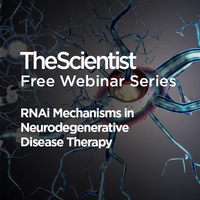Login
Subscribeaging

Epigenetic Manipulations Can Accelerate or Reverse Aging in Mice
Alejandra Manjarrez, PhD | Jan 12, 2023 | 4 min read
Repairing damaged DNA appears to drive aging by causing the loss of epigenetic information, but restoring that information reverses such effects, a study finds.

Vesicles from Young Mice Alleviate Signs of Aging in Older Animals
Catherine Offord | Oct 19, 2022 | 4 min read
Mice that received the stem cell–derived treatment were less frail compared with controls, a study reports.

Aging and Cancer: A Complex Relationship
The Scientist | 2 min read
An expert panel will discuss how aging affects cancer risk, development, and treatment practices.

Scientists Uncover Major Pathway Cells Use to Mend Leaky Lysosomes
Holly Barker, PhD | Oct 6, 2022 | 3 min read
Damaged lysosomes are repaired by a lipid-based signaling pathway dubbed PITT that could be targeted to treat neurodegenerative disease, its discoverers say.

Different Genes Influence Lifespan in Male and Female Mice
Natalia Mesa, PhD | Sep 29, 2022 | 3 min read
Researchers say there may be similar, human genes whose effects on lifespan vary by sex.

The Scientist Speaks Ep. 16 - At the Breaking Point: Mitochondrial Deletions and the Brain
The Scientist | 1 min read
Researchers characterize large mitochondrial deletions to understand their implications in neurological disorders.

T Cells Ward Off Aging with Help from Their Friends
Natalia Mesa, PhD | Sep 16, 2022 | 5 min read
Immune cells deliver packages of telomeres to T cells, helping them retain their virus-fighting function over time, research suggests.

Daily Multivitamin May Slow Cognitive Decline in Seniors
Andy Carstens | Sep 14, 2022 | 2 min read
Researchers caution that it’s too soon to recommend supplements based on the results of a new study.

RNAi Mechanisms in Neurodegenerative Disease Therapy
The Scientist | 1 min read
Experts will explore how RNAi mechanisms can modulate gene expression for the treatment of neurodegenerative diseases and how new methods for their use are being developed.

Secret to Reproductive Ants’ Longevity Revealed
Patience Asanga | Sep 2, 2022 | 3 min read
Researchers say they've figured out how some reproductive ants live up to 30 years—far longer than workers.

Clinton Cave Investigates How Brain Cells Communicate
Andy Carstens | Sep 1, 2022 | 3 min read
The Middlebury College neuroscientist explores enzymes that affect brain cell development and neurodegeneration.

Time Traveling Mini-Brains on a Mission to Conquer Space
Iris Kulbatski, PhD | Aug 11, 2022 | 4 min read
Alysson R. Muotri discusses his launch of brain organoids into outer space and how microgravity enriches our understanding of brain development and disease.

Through the Looking Glass: Aging, Inflammation, and Gut Rejuvenation
Iris Kulbatski, PhD | Aug 8, 2022 | 4 min read
Renewing the aging gut microbiome holds promise for preventing inflammatory brain and eye degeneration.

Gonorrhea-Blocking Mutation Also Protects Against Alzheimer’s: Study
Holly Barker, PhD | Aug 5, 2022 | 4 min read
Research traces the evolution of a gene variant that reduces the risk of Alzheimer’s disease, finding that it originally evolved in response to infectious bacteria.

How Immature Egg Cells in Ovaries Resist Aging
Shafaq Zia | Aug 4, 2022 | 3 min read
The cells’ mitochondria skip a key metabolic reaction that takes place in other cells in the body, a study finds.

Inside the Brains of Aging Dogs
Lesley Evans Ogden, Knowable Magazine | Aug 1, 2022 | 8 min read
In a citizen science project, thousands of pet dogs are helping scientists to understand what happens to memory and cognition in old age.

How Slow Can You Go?
Hannah Thomasy, PhD | Jun 23, 2022 | 5 min read
Two studies show negligible rates of aging in some types of turtles and other cold-blooded creatures, but that doesn’t mean they’re immortal.

Study Links Stress to a Faster-Aging Immune System
Margaret Osborne | Jun 21, 2022 | 4 min read
Health data from 5,744 adults over the age of 50 reveals an association between stressors such as discrimination and a relatively small proportion of younger infection-fighting immune cells.

Antioxidants Put the Pep Back in One’s Step
Niki Spahich, PhD | Jun 13, 2022 | 3 min read
Delivering antioxidants via extracellular vesicles to atrophied muscles restores them during rehabilitation.
